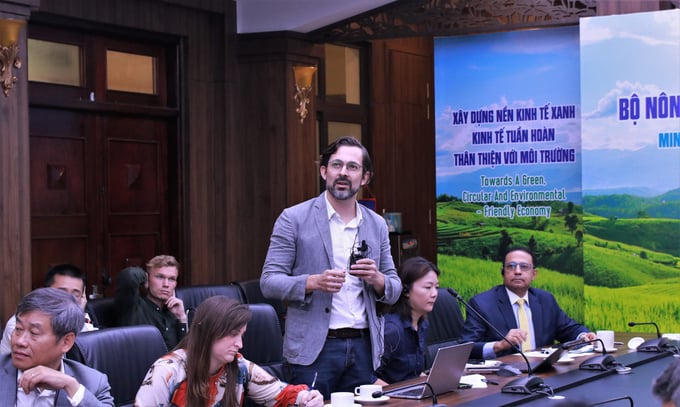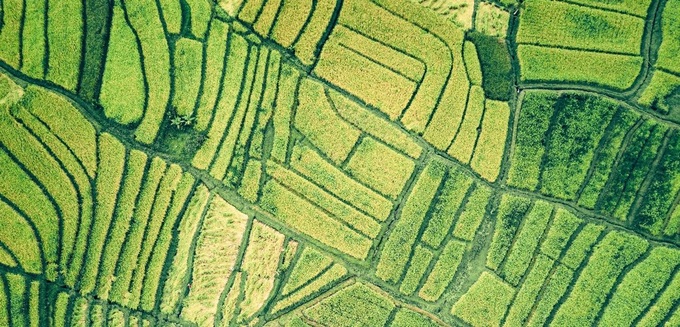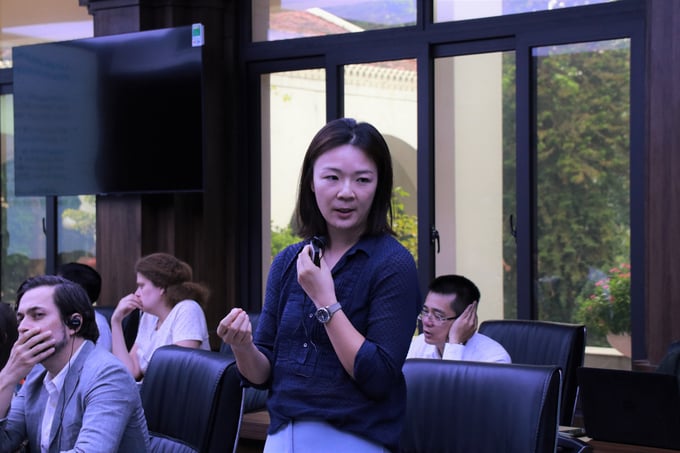November 23, 2025 | 21:31 GMT +7
November 23, 2025 | 21:31 GMT +7
Hotline: 0913.378.918
November 23, 2025 | 21:31 GMT +7
Hotline: 0913.378.918

Beau Damen, FAO Regional Office for Asia and the Pacific.
At the recent discussion on the Scheme for sustainable production of 1 million ha of high quality rice in the Mekong Delta, Beau Damen, representative of the FAO Regional Office for Asia and the Pacific, shared a number of perspectives from FAO. The contents were mainly aimed at supporting farmers to apply new technologies as well as agricultural practices to expand the production of high quality and low emission rice.
Having experience in implementing the system of rice intensification (SRI) and the measurement, reporting and verification (MRV) system, the FAO expert commented that emissions had been significantly reduced when building MRV around SRI models. “It can be said that the rice industry will gain a lot from MRV. For the scheme to achieve high efficiency, the agriculture sector needs to create the best conditions when implementing MRV. Regular and accurate data collection will bring positive contributions in the management of farming which improve rice quality and reduce emissions.”
However, Beau Damen believed that the benefits of this methodology had not been fully recognized in Vietnam’s rice production. To effectively apply the MRV system, the scheme needed to have specific mechanisms, develop institutions and call for the participation of farmers and the private sector.
“We can use public sector mechanisms such as taxes and credits to further support farmers. In addition to supporting resources, we can research and create conditions for farmers to interact with a number of in-field works. There also exists a number of possibilities such as grants or multilateral climate funds such as the Green Climate Fund (GCF)", said the FAO representative.

Changing farming in the high quality and low emission direction is a global trend, which is of special interest to international organizations.
Regarding future support activities, FAO will work with MARD and partners to use FAO projects to further establishment of rice MRV; move ahead with GCF Readiness & TCP projects to support design work for up high quality and low emission rice initiatives; seek more financial options, connecting the public sector with the private sector through blended finance; engage partners at the national and regional level to discuss ways forward on methodologies for rice emission crediting.
RBC/CF and the potential to change the face of Vietnam's rice industry
The Scheme for sustainable production of 1 million ha of high quality rice in the Mekong Delta has attracted much attention from the World Bank. If the scheme is put into practice and becomes a specific program of the Government of Vietnam, the World Bank estimates that the specialized farming area can reduce 10 million tons of carbon, selling for USD 100-150 million per year. This is not a small number for the rice industry, which is likely to change the face of the whole industry in the future.

According to the World Bank specialist, RBC/CF will open up many opportunities for Vietnam's rice industry to increase its brand recognition and enter the global carbon market.
But according to the World Bank climate specialist, low-emission rice in Vietnam is currently facing a number of challenges in terms of costs and financial incentives. The World Bank report shows that Vietnam will need to invest USD 515/ha to meet the average emission reduction target and USD 3,890/ha to reach the net zero emission target. The longer the transition to a low-emission rice model, the higher the costs will be.
In addition to different mechanisms and motivations from the public sector to upgrade infrastructure, the World Bank believes that more mechanisms are needed to encourage the participation of the private sector to change the farming behavior of farmers.
The results-based climate/carbon finance (RBC/CF) instrument is seen as a potential opportunity to address these challenges. By its nature as non-refundable finance, the RBC/CF is a powerful impetus for countries to not only work towards achieving their nationally determined contributions (NDC) goals but also to increase their efforts of reducing climate change. RBC/CF will be disbursed based on certified and verified GHG emission reduction results in accordance with international standards, thereby promoting the branding of high-quality Vietnamese rice with reduced emissions and high-priced carbon credits, helping Vietnam get closer to the NDC goals.
Regarding some proposals to support the RBC/CF program and the transformation to reduce emissions in Vietnam, the World Bank representative said that the World Bank would support USD 100 million to encourage the Ministry of Agriculture and Rural Development to create high-value carbon credit as a by-product in the process of the low-emission rice value chain transition in Vietnam in the 2021-2030 period.
This is also an opportunity for the Ministry of Agriculture and Rural Development to pilot an institutional framework and business model, thereby contributing to Vietnam’s general legal, regulatory and institutional framework that facilitates the formation of carbon credits as well as authorization, issuance, and financial mobilization under the Glasglow Climate Pact.
Translated by Samuel Pham
/2025/11/22/4018-4-213342_747.jpg)
(VAN) The Mekong Delta Agricultural Experts Club has attracted 143 experts and researchers to participate in providing consultancy and contributing initiatives to the development of one million hectares of high-quality rice.

(VAN) Ca Mau’s development of OCOP products opens a path to increasing cooperatives value, helping boost income, expand markets, and affirm collective economy's role.

(VAN) Turning seemingly ordinary coconut shells into unique jewelry and artwork, Nguyen Bang Nhi spreads the value of local culture through her brand, Cocohand.

(VAN) Results from the Sustainable Durian Model Project in Dak Lak have confirmed the critical role of Yara Viet Nam in transferring advanced nutritional solutions to farmers.

(VAN) In Tuyen Quang province, livestock farmers have introduced effective models and innovative practices that significantly strengthen African Swine Fever prevention and control efforts.

(VAN) This is the study conducted by IRRI and Can Tho University on the rice straw value chain in Mekong Delta showing an economic potential of more than 6.6 trillion VND/year.

(VAN) By participating in cooperative economics, many farmers in Tay Ninh have overcome hardship, mastered clean dragon fruit cultivation techniques.